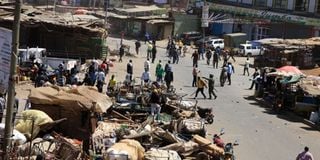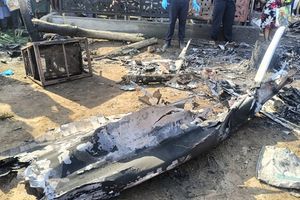Premium
Of Githurai chaos, tattered IEBC and ignored past warnings on poll violence

Police officers quell protests in Githurai 45, Nairobi, during a visit by ODM leader Raila Odinga on January 27, 2021.
What you need to know:
- The impunity the Waki commission blamed for the 2007 poll violence, which killed more than 1, 000 people, is rearing its ugly head again, going by recent cases of mayhem in political meetings.
Recommendations by two commissions that investigated the 2007 post-election violence continue to be ignored, with politically instigated chaos and a beleaguered electoral agency serving as warning signs ahead of next year’s elections.
The impunity the Waki commission blamed for the 2007 poll violence, which killed more than 1, 000 people, is rearing its ugly head again, going by recent cases of mayhem in political meetings.
And the recommendation by the Kriegler commission, which investigated the bungled 2007 elections, that a credible electoral commission should be installed at least two years to the polls seems a nuisance to politicians, with shattered confidence in the current polls team a recipe for disaster.
Last October, two people were killed in chaos that rocked Deputy President William Ruto’s visit to Kenol in Murang’a, and despite an order by the police chief to investigate the killings, nobody has been punished.
And the new year has opened with violence being witnessed in rallies addressed by ODM leader Raila Odinga in Githurai and the DP in Burma in Nairobi this week, pointing to rising political intolerance in the lead-up to the expected referendum on constitutional amendments.
The recurring events follow the eerily chilling pattern witnessed in the lead-up to the 2007 polls, which nearly plunged the country into civil war.
It starts with politicians mobilising supporters through hateful campaigns, a partisan state security machinery, police watching as hooligans attack perceived rivals and perpetrators getting away with crime.
After investigating why the government never bothered to arrest and prosecute those alleged to have incited, funded and promoted violence and why authorities instead went after minor actors in the 2007 mayhem, as happened with past tribal clashes, the Waki commission concluded it all amounted to official cover-up.
“Most administrators spoke of fear of the general population and also fear of the political leadership. There is, of course, a symbiotic relationship between the politicians and their supporters, which continues to fuel impunity. Politicians rely on their supporters to enforce immunity while their supporters, who are the hand maidens of the violence, get protection from the political godfathers,” the Waki report stated.
“This symbiotic relationship between the politicians and their supporters creates a real and genuine fear among those who enforce the law,” it added.

DP William Ruto arrives at AIPCA Kenol for a service and a fundraiser on October 4, 2020. There was chaos in the town before the DP's arrival.
Sponsorship claims
The violence witnessed in Kenol last year and in Nairobi this week has all the hallmarks of either state-sponsored chaos or that bankrolled by politicians secure in the knowledge they would get away with it, perhaps because of the political faction they lean towards.
After the bloody Kenol clashes, the DP’s camp accused the so-called ‘Deep state’ of sponsoring the chaos to stop him from visiting Murang’a. The DP toured the region days after Jubilee Secretary-General Raphael Tuju had announced he would be stripped off his position as Jubilee deputy party leader.
The ongoing feud between ex-Nairobi governor Mike Sonko and Interior Principal Secretary Karanja Kibicho about events following the disputed 2017 elections is telling.
In response to one provincial commissioner who had testified that he feared to order the arrest of senior politicians involved in the incitement of violence because his job would be at stake, the Waki commission stated: “There must be an end to this cowardice and pious sense of self-preservation in public service if impunity will be eradicated in this country.”
And referring to failure to act on the report by the Akiwumi commission that investigated the tribal clashes of the 1990s, the Waki commission said the lackadaisical manner in which the government dealt with the Akiwumi report illustrated that the state was not interested in resolving ethnic violence.
“Those who benefited from it were secure in the knowledge that the report, notwithstanding its deficiencies, would continue to gather dust and the issue of ethnic violence would be on the back burner, to be resurrected when the next election came.”
And even more worrying are reports that there was prior intelligence on the attack on Mr Odinga’s meeting in Githurai, but which, it would appear, was never acted upon – or perhaps never shared with relevant authorities at all. This presents a disturbing reminder of what happened in 2007.
“The post-election violence is also the story of lack of preparedness on the part of – and poor coordination among – different state security agencies. While the National Security Intelligence Service seemed to possess actionable intelligence on the likelihood of violence in many parts of the country, it was not clear whether and through which channel such intelligence was shared with operational security agencies,” the Waki commission observed in its report.

Nominated MP Maina Kamanda and ODM leader Raila Odinga address residents of Githurai 45 in Nairobi while promoting the Building Bridges Initiative on January 27, 2021.
State of IEBC
The happenings at the Independent Electoral and Boundaries Commission (IEBC) is the other alarming development ahead of next year’s elections.
The South African Judge Johann Kriegler-led Independent Review Commission, which investigated the 2007 General Election, recommended “a fully composed (electoral) commission should be in office for two years prior to the conduct of general or presidential elections”.
But 18 months to the election to pick President Uhuru Kenyatta’s successor, the IEBC only has three commissioners in office – four resigned in a huff in 2018 and 2017 – and the team in office is constantly being attacked politicians.
President Kenyatta, on October 28 last year, signed into law the IEBC (Amendment) Bill of 2019, which establishes a selection panel to oversee the filling-up of vacant positions at the commission, as well as future appointments to the electoral agency.
The new law also sets the criteria for the selection of IEBC Commissioners and outlines the qualifications of members of the selection panel.
But the recruitment process is yet to begin, which means by the time new poll managers are hired, it will be much closer to the election to pick the fifth president, a situation that could fuel claims of partisanship.
The process could also be derailed by litigation.
The Law Society of Kenya (LSK) is among the agencies expected to pick a representative to the selection panel.
But its president Nelson Havi has insisted that any business transacted by Parliament is illegal, citing the advisory by the Chief Justice to President Kenyatta to dissolve Parliament for the failure to enact the two-thirds gender law.
And, the current polls team – comprising Chairman Wafula Chebukati and Commissioners Abdi Guliye and Boya Molu – is constantly under attack particularly by ODM leaders.
Siaya Senator James Orengo last year branded the IEBC a “criminal enterprise” that ought to be disbanded but was only being spared because a poll commission is needed to oversee the referendum on proposed Building Bridges Initiative (BBI) constitutional reforms.
“This IEBC is a criminal enterprise. It really should go, but because they are going to hold one single election, I think we can live with it,” Mr Orengo said in January last year.
“This targeted onslaught against the commission is not new, as it has been occurring after every general election since 1992, the sustained campaigns to weaken and interfere with the independence of the commission,” Mr Chebukati responded.

IEBC chair Wafula Chebukati, Commissioner Abdi Guliye, acting CEO Marjan Hassan Marjan and BBI Secretariat co-chair Dennis Waweru at Bomas of Kenya in Nairobi during the launch of the BBI signature verification exercise on December 30, 2020.
BBI “sabotage”
In January this year, angered by the slow pace of verification of signatures to back the BBI draft constitutional amendment Bill, ODM leaders accused IEBC of scheming with their opponents to frustrate the process.
National Assembly Minority Whip Junet Mohammed and BBI co-chair accused the commission of “being part of the scheme that is sabotaging BBI”.
“The process of signature verification is part of the IEBC’s mandate as articulated in Article 257 of the Constitution and, therefore, the commission cannot sabotage it,” Mr Chebukati responded.
Prior, the draft BBI task force report released in October last year proposed a purge of the IEBC.
“IEBC notes that it has been singled out as the only independent commission and indeed entity whose establishment is sought to be removed by way of the proposed changes,” Mr Chebukati said in a statement on October 23, last year.
“The source of the current attacks on the commission is founded on the outcome of one Supreme Court Presidential Petition No. 1 of 2017,” he added, referring to the verdict by the top court led by Chief Justice David Maraga that nullified President Kenyatta’s victory following the disputed August 2017 election.
Mr Chebukati went on: “The criminality and unsuitability to hold office narrative driven by certain members of the political class is meant to incite the public with the intention of mob-lynching the commission and its staff, and also to create a justification for the ‘clean slate’ recommendation in the BBI Report.”
ODM leader Raila Odinga, whose team had successfully petitioned the court to overturn the incumbent’s win citing fraud, snubbed the subsequent presidential re-run in October.
Mr Odinga would later reach a truce with President Kenyatta, which has estranged the President’s deputy, Ruto.
But the IEBC exposed itself to the attacks because of the wrangling by the commissioners before and after the 2017 elections, a fiasco that ended in one commissioner fleeing to the United States and the other three quitting with a scathing attack on the chairman.
Ms Consolata Nkatha, who served as Mr Chebukati’s deputy, and then commissioners Margaret Mwachanya and Paul Kurgat, protested over the suspension of then chief executive officer Ezra Chiloba.
“The events related to the purported vote (to suspend the CEO) have greatly shaken our already feeble confidence in the chair,” the three commissioners said in a statement in April 2018.
They added that not all six commissioners were present, as required, when the vote happened.
In October 2017, another commissioner, Ms Roselyn Akombe, quit a week to the presidential election rerun, citing fears for her life.
Both Waki and Kriegler commissions traced the genesis of the crisis to “the presidency being seen as the ultimate political prize”.
“The widespread belief that the presidency brings advantages to the president’s ethnic group makes communities to wilfully use violence to attain and keep power,” stated the Waki commission.
The Kriegler commission wrote: “Elections involve high stakes. Their credibility is tied to national stability, and the winning and losing of elections is tied to political party power. As is evident in many parts of the world, elections can precipitate an outbreak of violence or, where this has occurred before, a recurrence of violence.”
These developments show the country is courting disaster in the lead-up to the next polls – and the urgency to change course.
Kriegler warned the 2007 violence would seem a walk in the park compared to the crisis that would engulf the country in the future if Kenyans allowed a repeat of the dangerous actions that led to the chaos.





